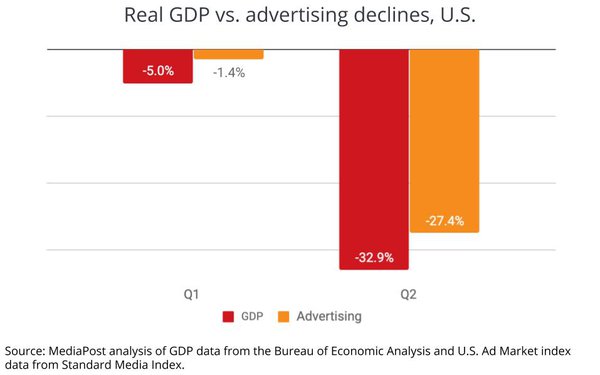
Nearly two quarters into the U.S. economic
recession, advertising appears to be outpacing the U.S. economy, according to an analysis of data from the U.S. Bureau of Economic Analysis (BEA) and Standard Media Index (SMI).
The BEA
Thursday released estimates that real GDP (gross domestic product) contracted 32.9% during the second quarter of the year, following a contraction of 5% during the first quarter.
By
comparison, the U.S. ad economy contracted only 27.4% during the second quarter and 1.4% during the first quarter of the year. That analysis is based on the U.S. Ad Market Tracker, a collaboration of
SMI and MediaPost that indexes at market growth monthly.
Based on first half averages, the U.S. economy contracted 19.0%, while the U.S. ad economy declined 14.4%.
While the current
U.S. economic recession appears unprecedented due to the nature of its causation -- the COVID-19 pandemic, which virtually shut down entire areas of economic activity, and put millions of Americans
out of work -- the ad economy so far appears more resilient.
advertisement
advertisement
How long that will continue is anyone's guess, but historically the U.S. ad industry has lagged going into and coming out of U.S.
economic recessions due to the fact that some forms of advertising have long-term media commitments and because there often are latencies between economic activity and ad budgeting by major
marketers.
However, in recent history marketers have moved their media buying and planning cycles much closer to "just-in-time" decision-making and commitments.
Lastly, it should be
noted that the U.S. ad index developed by SMI and MediaPost has an inherent bias toward the kind of big advertisers handled by the major agency holding companies, and may not be representative of the
"long-tail" of smaller and medium-sized businesses.
But Facebook, which announced its second quarter results on Thursday, sent a strong signal that small and medium-sized businesses that
comprise much of its auction-based advertising base, are actually performing well in terms of ad demand.
"The advertiser base is up to 9 million with total business accounts growing to 180
million (from 140 million in the fourth quarter of 2019)," BMO Capital Markets analyst Daniel Salmon writes in a report sent to investors this morning.
"Facebook's top 100 advertisers now make
up just 16% of total revenue, which is less than last year," he continues, indicating that if anything, Facebook is performing well, while even more dependent on smaller advertisers.